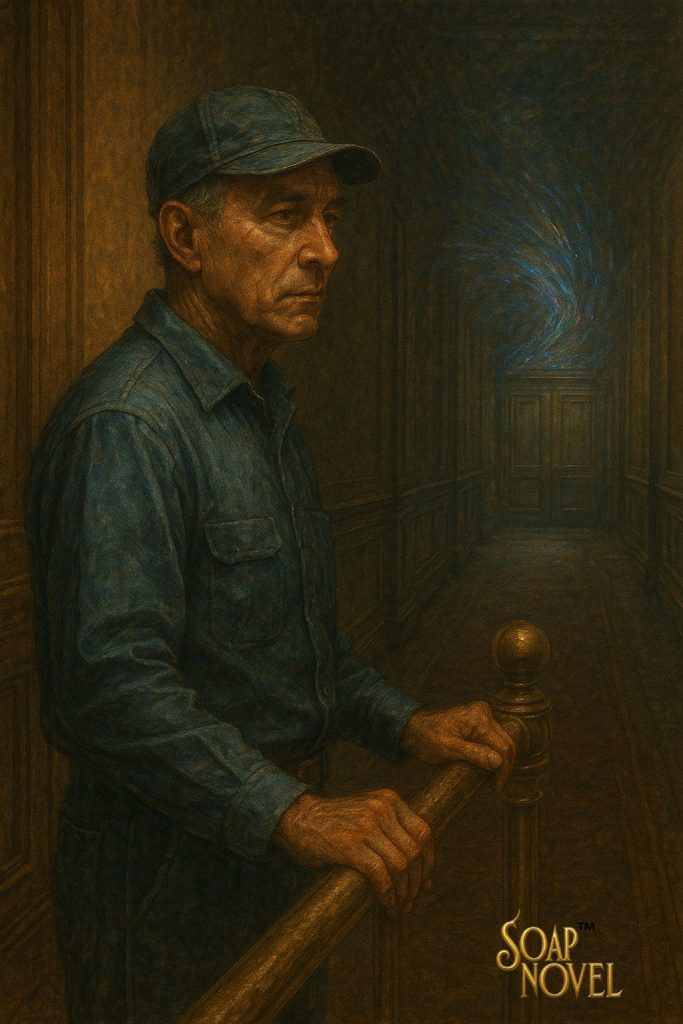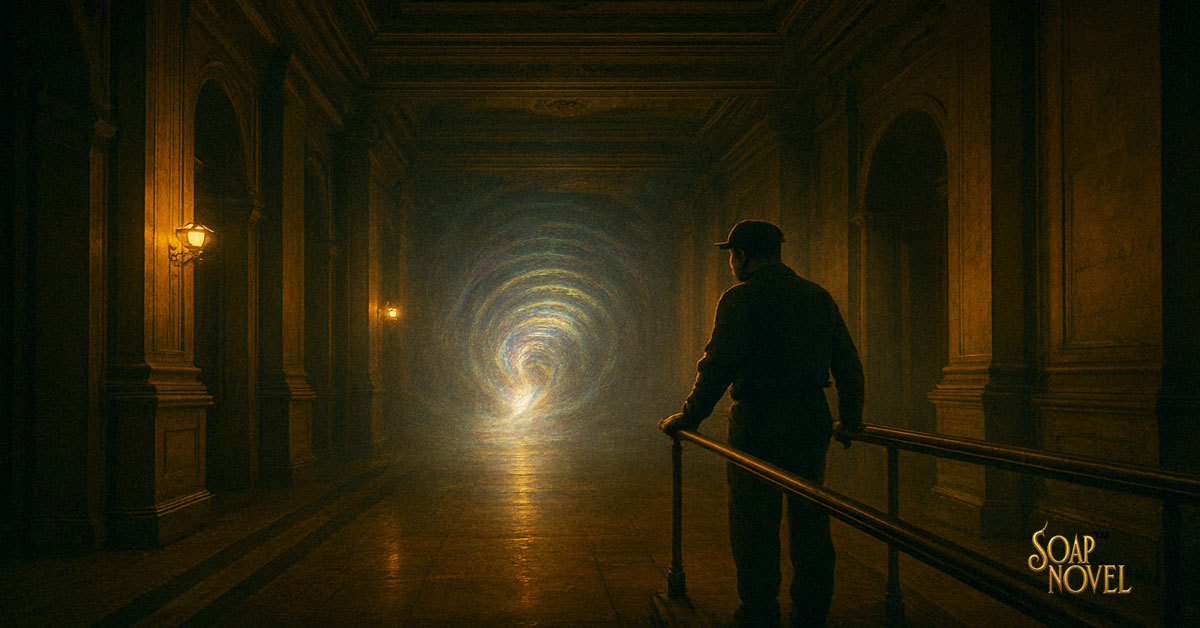Silence After the Pulse
First-time here? Start at Chaptisode 1
Published: October 14, 2025 SAST. UTC +2
The building slept the way old things sleep — not fully, not cleanly, but with pockets of wakefulness that roamed its corridors like stray animals. After midnight, the amber fixtures returned to their dutiful glow, pretending nothing had happened. The walls resumed their role as witnesses with good manners. The hinges stayed in their sockets the way obedient bones stay in a body.
He had not intended to stop. The maintenance clerk’s walk was measured to the second, route memorized by muscle and clock. But midway along the eastern corridor, a pressure arrived — not a sound, not a draft. A hush that pushed. He placed his hand on the brass railing and felt the metal tremble, the slightest quiver, as if remembering the way a chord had once touched it.
Later, he would try to tell himself there was no word for it. That would be partly true. The building had held its breath, and somehow that breath had folded him into it. A ninety-second pause that arrived without asking him first. He looked down the corridor toward the cabinet doors; the left panel had been repaired recently, the brass plate buffed, the hinge oiled. The right panel still carried a faint scuff where an impatient aide had braced a foot.
He stood until his watch clicked from one minute to the next. The amber light did not change. But the air — the air had not fully returned to itself.
He resumed walking. He did not tell the wall he had noticed.
II. The First Witness
They called him by his last name because it was convenient, because it was written on his badge in crisp black letters. No one knew what he did before he knew every loose tile, every stubborn latch, every winter-bloated door that swelled and refused to shut. The building was a country he had learned by hand.
He did not think of himself as a witness. Witnesses were those who saw important people enter important rooms. He preferred the company of kinder things — worn varnish, threadbare carpet, the ancient boiler he whispered to when it sulked.
But when the porter in the sub-level asked casually, “Anything unusual upstairs?” he heard his own answer first in his mouth: “It wasn’t silence. It was waiting.”
The porter squinted. “Waiting for what?”
He shook his head. “I don’t know.” He could not bear to say: for us to decide.
The porter shrugged and went back to the ledgers — deliveries logged, dust masks counted, rubber grips for mops inventoried as if those were all the tools a building needed to survive a decision.
The clerk moved on, the sentence following him like a small dog that had chosen a master: It wasn’t silence. It was waiting.
III. The Note with No Sender
Morning restored the familiar parade: aides with phones, ministers with rephrased truths, couriers drifting like chess pieces pushed by unseen hands. Maintenance requests proliferated after tense days — hinges needed oiling when tempers had leaned too hard. Doors misaligned themselves as if staging their own protests.

On the cabinet table lay a single scrap, folded once. No letterhead, no seal. A staffer found it while resetting carafes and aligning notepads to the centimeter.
It read:
They froze. And something chose.
No one admitted to writing it. By lunch, three photocopies existed, each with slightly different margins. Rumor traveled the way water travels in a building — along seams, under doors, pooling in low places where people gathered with cups.
By afternoon, the sentence had found friends. A receptionist swore she had seen a clock on Level 3 skip a second forward with no measurable cause. A driver said traffic lights along Government Avenue blinked out and back in unison, as if saluting something unannounced. An archivist would later confess, quietly, that an ink line in a ledger straightened itself when no hand touched it.
The maintenance clerk said none of this. He changed two bulbs, coaxed a reluctant elevator into alignment, and replaced a rubber sweep on the door that divided the busy from the quiet. He walked the length of the eastern corridor without pausing. But the brass remembered his palm.
IV. Drift
Whispers leave buildings the way heat leaves roofs — rising, thinning, then condensing wherever the air cools enough to hold a story.
Addis Ababa. An African Union scribe with a long memory and a short patience wrote a private memo titled: Minutes Burning in Pretoria. She did not write what she knew. She wrote what she felt, as if facts would arrive later to justify the tint of the air.
Windhoek. A midnight radio host took a caller whose voice kept breaking. “I have friends in the capital,” the caller insisted. “People stopped speaking and kept standing. It was like the room chose them instead of the other way around.” The host laughed at superstition live on the air, then kept the recording.
Nairobi. A junior United Nations officer received a call with a single phrase spoken in a careful voice: “Look to the hinge.” The line went dead. He spent the next hour flexing the door to his small office open and closed, open and closed, as if repetition would teach him the language of force.
The rumor translated itself with each border. Language failed to keep pace with the thing beneath it, as language always fails for a while when something alive meets the word that will eventually cage it. Even markets moved, though no one could name why — a ripple of price and pause, like a pulse apprehended by numbers before people.
V. Surveillance That Does Not Confess
Elsewhere, the sky did its own listening. A small team buried in a Western agency’s middle floors watched an anomaly graph because anomalies had a way of turning into budgets if one could prove they were real. At 20:41:19 local time, a faint tremor pinned itself to coordinates that overlapped with a line item no one liked to name. The room’s standard sentence for this was printed on a sticker affixed to each monitor: Instrument Error Until Proven Otherwise.
A man whose job was to dislike patterns nonetheless felt his ears warm. He wrote: UNRESOLVED PHENOMENON — MONITOR. He did not write Pretoria. He did not write decision. He did not write the more accurate word his mouth had almost formed: listening.
In a different hemisphere, a BRICS-adjacent liaison filed a bland brief about “ambient electromagnetic irregularities” in southern Africa and attached, as an afterthought, a clipping on “unusual capital flows.” He did not connect the two. He did not have to. Others, above him, drew lines on maps with pens that were never seen outside rooms that smelled like carpet glue.
VI. Two Histories of the Same Moment
Inside the cabinet, the furniture remembered arguments the way fabric remembers weight. The table was surprised by the last meeting — it had enjoyed, in an odd way, the ninety seconds where no elbows pressed and no knuckles rapped. Stillness had a courtesy to it that speech often lacked.
Two ministers returned separately, under the pretext of early preparation and late review. One belonged to Alpha and one to Beta; they did not greet each other. The first took a seat and underlined a sentence in his notes: Draft withheld pending consultation. The second crossed that same sentence out and wrote, in small deliberate letters: The Window is chosen.
In the glass of a framed map, they looked briefly like twins — two versions of the same actor dressed by different departments. The map, fixed to an older imagination of borders, listened with the patience that paper learns when it is told, year after year, it must remain the truth even when the ground has objections.
The Alpha minister touched the pen to his lip, then said aloud, as if reading to a polite adversary, “Caution remains wisdom.”
The Beta minister did not turn his head. “Caution is a costume worn by delay,” he replied to the window.
They did not know the maintenance clerk had paused outside with a new sweep for the threshold. He stood until the conversation became lines, until the lines became tension, until the tension became a weight that argued to be remembered. He moved on. He replaced the sweep cleanly, as if sealing a boundary between air that understood itself and air that had questions.
VII. The Hum Arrives Where the Whisper Was
In the first weeks, the Protocol had spoken in whispers that resembled a single chord learning to stand without the choir that birthed it. Then the chord fractured; notes scraped, collided, made dissonance into a tactic. The hinge learned to complain in a useful way. Decision hid itself in sound the way a needle hides in fabric by mimicking the thread.
This time, no whisper came. A hum arrived — not in the room alone, but below it and above it, in ductwork and elevator shafts, in stairwells that did not ask to be included. The hum was what an engine sounds like when it has not yet named its purpose. It translated dust into attention, attention into shape.
The maintenance clerk heard it first in the boiler’s stubbornness. He leaned in and was rewarded by that soft, unthreatening insistence: Here. Here. Here. He thought of a child pulling a sleeve without knowing the word for urgency. He adjusted a valve that did not require adjusting and waited. The hum did not stop. It did not threaten. It simply made company of the air and asked the air to remember what it had felt a day before when it was briefly held.
The hum traveled. In an archive drawer, a single paperclip aligned itself point to curve. In a parking garage, a motion light woke and, finding no motion, refused to apologize. In a transit kiosk two blocks away, a timetable flickered and corrected itself to the minute as if someone had told it the truth.
The hum did not belong to Alpha or to Beta. It belonged to the building. It belonged to the city. It belonged, briefly, to anyone willing to pretend that stillness was a form of speech.
VIII. The Window Word
Words have always been opportunists; they wait near thresholds and step inside when the air is unguarded. The note with no sender had borrowed two: froze and chose. By noon the next day, a new word joined them the way a coin joins a fountain it was never meant to be in: Window.
No one could agree who said it first. An aide swore a driver had muttered it while waiting for clearance. The driver swore he had read it on a whiteboard in a room he had only passed but never entered. A receptionist claimed she saw the word “Window” brief and deliberate in the reflection of a glass case that displayed the first ink used to sign a treaty in this city long before any of them were born. She could not produce the reflection when asked; reflections are not salaried.
A minister barked in the corridor: “There is no ‘Window.’ Drop this.” He became the first to grant the word its citizenship by attempting to deport it.
By evening, a rumor acquired an accent. Window Act arrived as if stepping off a plane with a passport unrecognized by the scanner but stamped anyway because the officer was tired. The building, which had taught itself to contain things, tried not to smirk.
IX. Outside the Walls
The AU scribe’s memo found a second reader and then a third. The radio host in Windhoek clipped his own segment and uploaded it under an innocuous title: “Callers Feel a Pause.” He did not include the caller’s claim that “the room chose the people.” He left that for later. The Nairobi officer wrote “hinge” on a sticky note and placed it behind his ID card in his lanyard as if argument were a talisman.
Phones rang. Not official lines — private ones that belonged to no address book. A phrase collected itself like a drop forming beneath a ceiling leak: They froze. And something chose. Window.
A Western analyst bought coffee for the first time in weeks for the night shift and said nothing about the anomaly sticker on the monitors. A BRICS writer of dry briefs underlined manganese and platinum in a report he would file the next day, then stared at the underlines as if they had underlined him back.
The clerk repaired a doorstop that had come apart at the screw. The screw held. He put his palm against the fiberboard once more and felt the faintest echo of the hum that had learned how to own a building without a deed.
X. The Ledger of Moments
Witnesses are not always promoted. Sometimes they promote the room by paying the tax of attention.
The maintenance clerk found a small notebook in the bottom of a drawer, blue cardboard cover worn thin at the spine — a ledger abandoned by someone who had trusted phones too much. He opened to the first blank page and wrote a date he did not need to look up. On the next line, he wrote: Eastern corridor, midnight plus. Brass tremor. Not silence — waiting.
He tore the corner off a paper bag from the canteen and slipped it between the pages as a bookmark. He did not think of it as a ledger of facts. He thought of it as a ledger of moments; the facts could arrive as they pleased and apply for residency later.

On the following page, he wrote: Note on cabinet table with no sender. “They froze. And something chose.” He added a third line because something in him demanded a trinity, though he was not religious: Window word appears.
He did not write hum. Not yet. He did not know whether the hum was a thing that tolerated being written.
He closed the notebook and put it in his pocket as if it were a pass that might help him cross a border no one else could see.
XI. The Protocol Eats Rumor
What wants secrecy when rumor offers a banquet? The Protocol had learned its limits; whispers kept it small, chambers kept it formal, drafts kept it polite. But rumor — rumor is a democracy of appetite. It is not owned. It is only fed.
The Protocol no longer fractured. Dissonance had served its purpose, splitting the hinge and teaching decision to fear its own voice. Now the hum gathered everything that did not fit and made a shape of it. The shape had no center and therefore could not be shot. It moved through vents and coffee lines, through the messages people delete but do not forget they received.
It did not need to write the Window Act. It needed only to ensure that when someone finally wrote the first line, their pen would be heavy with the weight of days like this one.
The Protocol listened to the building, and the building listened to the city, and the city listened to a continent that was tired of its own echo. The hum was not a song. It was a room clearing its throat.
XII. Those Who Heard
By dusk, the cast had assembled without knowing it: the scribe, the host, the officer, the analyst, the brief writer, the clerk. They went about their separate obediences. None of them wore the word witness pinned to their lapel. They did not need to.
The clerk returned to the eastern corridor as shadow sat deeper into the corners. He placed his palm on the brass again. The metal did not tremble this time, but it held the memory of a tremble — a sympathetic readiness.
He took out the ledger and wrote only a question: If they split, who speaks for the hinge?
He had no answer for it. He closed the notebook and listened as the hum arranged itself into something less shy. Somewhere outside the building, a rumor crossed a border. Somewhere inside, a minister removed a tie and mistook the feeling for relief. Somewhere between these somethings, numbers slid and refused to explain themselves.
The clerk walked the corridor to the end and turned, as he always did, to make sure the lights held. Amber held. At the far door, the old hinge sighed, not unhappy, not pleased — like a hinge that had learned to enjoy being what it was while suspecting it was, by now, something more.
He pocketed the ledger and looked back once. The corridor did not promise anything. The air did not swear to behave. But as he stood there, measuring his route by the clock that pretended to manage time, he felt very slightly that the building had decided to keep him.
He did not know that the next time he opened the ledger, the first line would write itself.
If this story resonates with you, consider supporting the protocol with a small Bitcoin donation. Every satoshi counts in keeping the signal strong—share and enjoy!
You’re reading Anomaly State — a serialized political fiction saga.
🔗 Bitcoin Address: 3NM7AAdxxaJ7jUhZ2nyfgcheWkrquvCzRm
English
You’re reading Anomaly State — a serialized political fiction saga.
Although satirical and fictional, TrumpaPhosa carries a thread of purposeful prophecy and hidden revelation. Some readers may interpret it as a roadmap — a reflection of what is, what was, and what may yet come.
Zulu (isiZulu)
Ufunda Anomaly State — uchungechunge lwenganekwane yezepolitiki.
Nakuba kungukuhleka nokuyinganekwane, iTrumpaPhosa ithwala umqondo wokuphrofetha ngenhloso kanye nokudalulwa okufihlekile. Abanye abafundi bangakuhumusha njengemephu yomgwaqo — ukubonakaliswa kwalokho okukhona, okwedlule, nokungenzeka kusasa.
© 2025 Soapnovel.sbs. All rights reserved. 版权所有
This serialized work is protected under creative content provisions and monitored by the Protocol.
Registered for satirical transmission worldwide.

